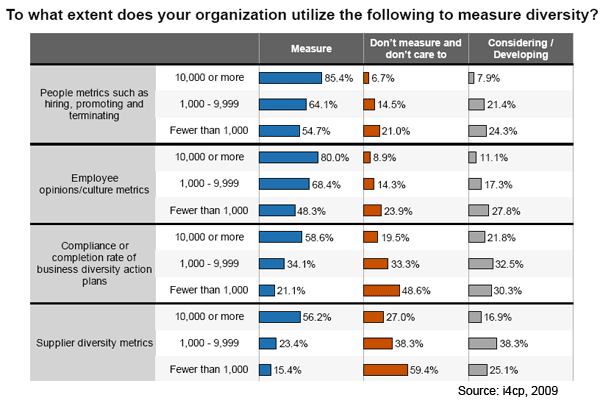HR metrics: What do high-performing companies track?
Want to be a high-performing company? Then track your talent. A new study on HR metrics by i4cp shows that higher-performing companies are more apt to measure talent-related metrics than lower performers. Common talent-related metrics include movement within the organization, quality of hires, quality of promotions and the cost of training/development.
For example, 93% of higher performers measure employee engagement, compared with 79% of lower performers. In this economy in particular, engaging the workforce is of paramount importance. Ninety-three percent of higher performers utilize employee engagement surveys, compared with 78% of lower performers. Ninety percent of high performers report the use of satisfaction surveys for such measures, compared with 68% of lower performers.

The study - commissioned internally by i4cp - also found several other significant traits for high-performing organizations. For example, 71% of higher performers measure compliance or completion of diversity plans (52% in lower-performing companies), and 61% of higher performers, compared with 39% of lower performers, consider employee referral rates.
Conversely, the study showed that 78% of lower-performing organizations measure total labor cost to cost revenue percentage, compared with 55% of high-performing organizations. A higher percentage of lower performers (44%) also measure the employee-to-productivity-output ratio than higher-performing companies (25%).
The contrast is striking, but, as Mary Ann Downey, i4cp's Talent Pillar Director, says, "it most likely reflects the attitude that low-performing organizations see their employees a mere expense and not a source of competitive advantage."
For example, 93% of higher performers measure employee engagement, compared with 79% of lower performers. In this economy in particular, engaging the workforce is of paramount importance. Ninety-three percent of higher performers utilize employee engagement surveys, compared with 78% of lower performers. Ninety percent of high performers report the use of satisfaction surveys for such measures, compared with 68% of lower performers.

The study - commissioned internally by i4cp - also found several other significant traits for high-performing organizations. For example, 71% of higher performers measure compliance or completion of diversity plans (52% in lower-performing companies), and 61% of higher performers, compared with 39% of lower performers, consider employee referral rates.
Conversely, the study showed that 78% of lower-performing organizations measure total labor cost to cost revenue percentage, compared with 55% of high-performing organizations. A higher percentage of lower performers (44%) also measure the employee-to-productivity-output ratio than higher-performing companies (25%).
The contrast is striking, but, as Mary Ann Downey, i4cp's Talent Pillar Director, says, "it most likely reflects the attitude that low-performing organizations see their employees a mere expense and not a source of competitive advantage."

Erik is the head of marketing at i4cp, and has nearly 20 years in the market research and human capital research industry.